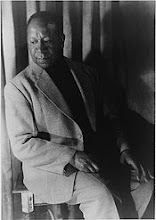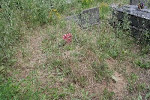Clark arrived in Paris in 1952, the year before Beauford settled there. He sailed on the SS Liberté (as Beauford did in 1953), and described the treatment that he received as a passenger traveling third class as being better than he could have ever imagined—great food and wine, waiters dressed in coat and tie, shoe-shine service, movies...
Upon arrival in Paris, Clark settled in the Hôtel des Ecoles on rue Delambre. By the time Beauford arrived and moved into this hotel, Clark had moved across the street to number 22. They first met at the Ecole de la Grande Chaumière, an art school in the neighborhood. Many Americans on the GI Bill studied at this school, and Clark was one of them.
Académie de la Grande Chaumière
© Discover Paris!
Plaque from the Académie de la Grande Chaumière
© Discover Paris!
Though twenty-five years younger than Beauford, Clark considered himself a mentor of sorts for Beauford during the first years of their friendship. He did not think much of Beauford’s art at the time because he was focused on classic, faithful reproductions of persons and objects. He considered Beauford’s work to be that of an “outsider”—someone whose style was avant-garde, and therefore undesirable. (He apparently did not know that Beauford had drawn beautiful, “classic” portraits during his Boston and New York years.) He also felt that he was qualified to advise Beauford because he had a one man show at a “blue chip” gallery in Paris (1955) at a time when Beauford had not yet enjoyed having his work shown in Paris.
Now, with the passage of time and the advantage of hindsight, Clark considers that Beauford was a genius. He particularly admires Beauford’s self-portrait at the Art Institute of Chicago, stating that the painting “lights up the room.” He recalls a sketch that Beauford did of him during the 50s that he dismissed at the time, but now describes as “powerful.”
Ed Clark and Beauford Delaney at the Noir 3 USA exhibition
American Center of Paris 1969
Photo courtesy of Ed Clark
Clark recalled minute details about Beauford’s personal habits, such as the fact that he loved spirituals, liked cognac, and did not eat pork. He described Beauford as someone who sketched and painted all the time, noting that he worked quickly. He also described Beauford as a great conversationalist, and said that he shared sage advice with friends and acquaintances.
Though Clark moved from Paris to New York in 1956, he would visit Beauford on subsequent trips to the French capital. He recounted a story about the concierge of the building at 53, rue Vercingétorix, where Beauford has his last studio. At that time, concierges were truly gatekeepers of apartment buildings. Anyone wanting access into the building had to pass by them. Clark mentioned that Beauford’s concierge once asked him whether Beauford was the President of the U.S. or some other important person, given the number of famous people who visited him there.
On that particular occasion, Beauford was entertaining four “important people.” Clark sat with them while they chatted with Beauford. When they left to go to dinner, Beauford beckoned to Clark and began to pull humble provisions from his cabinets—sardines, bread, wine… As they sat down to break bread together, Beauford said, “That’s how one helps another.”















